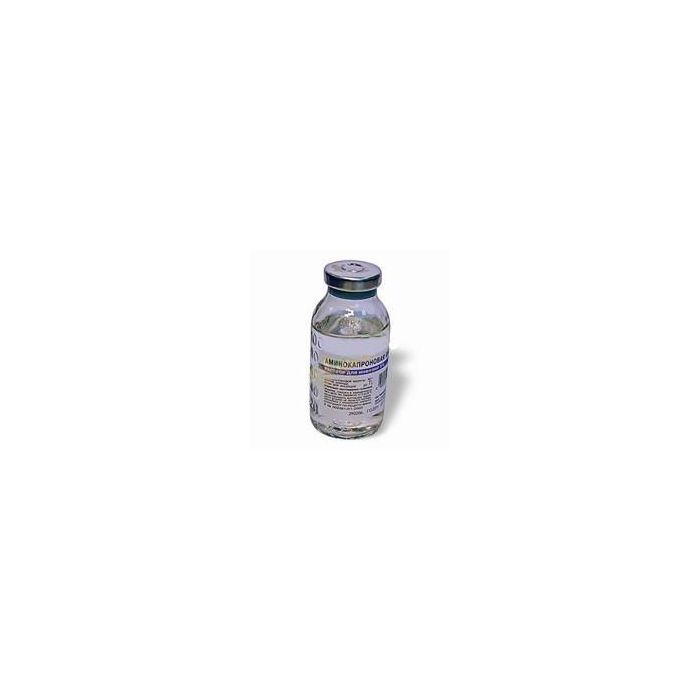Amynokapronovaya acid | Aminocaproic acid vials 5%, 100 ml
Special Price
$14.70
Regular Price
$22.00
In stock
SKU
BID535692
Latin name
Aminocaproic acid
Aminocaproic acid
Latin name
Aminocaproic acid
Release form
Solution for infusion 5%
Packing
Bottle 100 ml.
Pharmacological action
Aminocaproic acid - a hemostatic agent, fibrinolysis inhibitor. It blocks the action of plasminogen activators, inhibits the action of plasmin, partially inhibits kinins. Aminocaproic acid also has some anti-allergic activity and slightly increases the antitoxic function of the liver.
Indications
For stopping bleeding during surgical interventions and various pathological conditions, accompanied by increased fibrinolytic activity of blood and tissues (after operations on the lungs, prostate, pancreas and thyroid gland). Prevention of the development of secondary hyperfibrinogenemia with massive transfusions of canned blood.
Contraindications
hypersensitivity
hypercoagulation (thrombosis, thromboembolism)
tendency to thrombosis and thromboembolic diseases
cerebrovascular accident
DBC pregnancy syndrome.
Caution:
arterial hypotension
valvular heart disease
insufficiency
CRF.
Use during pregnancy and lactation
Contraindicated in pregnancy and lactation.
Composition
1 ml contains: aminocaproic acid 50 mg.
Dosage and administration
Aminocaproic acid solution is administered intravenously.
For adults, the drug is administered intravenously in the form of a 5% solution in an amount up to 100 ml dropwise at a rate of 50-60 drops per minute (for 15-30 minutes). During the first hour, it is recommended to introduce 4-5 g (80-100 ml) of the drug, and then, if necessary, 1 g (20 ml) every hour for about 8 hours or until the bleeding stops completely. In case of ongoing or repeated bleeding, injections of a 5% aminocaproic acid solution are repeated every 4 hours.
The administration of an aminocaproic acid solution can be combined with an infusion of glucose solution, hydrolysates and anti-shock solutions. In acute fibrinolysis, when the content of fibrinogen in the blood drops sharply, the introduction of aminocaproic acid must be supplemented by a subsequent infusion of fibrinogen.
Side effects
dizziness
headache
tinnitus,
nausea
diarrhea
nasal congestion
skin rash
decreased blood pressure
orthostatic hypotension
cramps
rhabdomyolysis
myoglobinuria
acute renal failure sardlkpardis
Drug Interaction
May be combined with administration of hydrolysates, glucose solutions (dextrose solutions), anti-shock solutions. In acute fibrinolysis, the introduction of aminocaproic acid with a fibrinogen content of 2-4 g (maximum - 8 g) should be supplemented with a subsequent infusion.
Anti-aggregate reduction with simultaneous administration of direct and indirect anticoagulants.
No medicines should be added to the aminocaproic acid solution.
Overdose
Increased side effects (dizziness, nausea, diarrhea, upper respiratory tract catarrh) and severe suppression of fibrinolysis.
In cases of overdose, plasminogen activators (streptokinase, urokinase or anistreptase) should be given urgently.
Storage conditions
Dry, protected from light and inaccessible to children, at a temperature not exceeding 25 РC.
The Expiration of
is 3 years.
Deystvuyuschee substances
Amynokapronovaya acid
pharmacy terms and conditions prescription
Krasfarma, Russia
Aminocaproic acid
Release form
Solution for infusion 5%
Packing
Bottle 100 ml.
Pharmacological action
Aminocaproic acid - a hemostatic agent, fibrinolysis inhibitor. It blocks the action of plasminogen activators, inhibits the action of plasmin, partially inhibits kinins. Aminocaproic acid also has some anti-allergic activity and slightly increases the antitoxic function of the liver.
Indications
For stopping bleeding during surgical interventions and various pathological conditions, accompanied by increased fibrinolytic activity of blood and tissues (after operations on the lungs, prostate, pancreas and thyroid gland). Prevention of the development of secondary hyperfibrinogenemia with massive transfusions of canned blood.
Contraindications
hypersensitivity
hypercoagulation (thrombosis, thromboembolism)
tendency to thrombosis and thromboembolic diseases
cerebrovascular accident
DBC pregnancy syndrome.
Caution:
arterial hypotension
valvular heart disease
insufficiency
CRF.
Use during pregnancy and lactation
Contraindicated in pregnancy and lactation.
Composition
1 ml contains: aminocaproic acid 50 mg.
Dosage and administration
Aminocaproic acid solution is administered intravenously.
For adults, the drug is administered intravenously in the form of a 5% solution in an amount up to 100 ml dropwise at a rate of 50-60 drops per minute (for 15-30 minutes). During the first hour, it is recommended to introduce 4-5 g (80-100 ml) of the drug, and then, if necessary, 1 g (20 ml) every hour for about 8 hours or until the bleeding stops completely. In case of ongoing or repeated bleeding, injections of a 5% aminocaproic acid solution are repeated every 4 hours.
The administration of an aminocaproic acid solution can be combined with an infusion of glucose solution, hydrolysates and anti-shock solutions. In acute fibrinolysis, when the content of fibrinogen in the blood drops sharply, the introduction of aminocaproic acid must be supplemented by a subsequent infusion of fibrinogen.
Side effects
dizziness
headache
tinnitus,
nausea
diarrhea
nasal congestion
skin rash
decreased blood pressure
orthostatic hypotension
cramps
rhabdomyolysis
myoglobinuria
acute renal failure sardlkpardis
Drug Interaction
May be combined with administration of hydrolysates, glucose solutions (dextrose solutions), anti-shock solutions. In acute fibrinolysis, the introduction of aminocaproic acid with a fibrinogen content of 2-4 g (maximum - 8 g) should be supplemented with a subsequent infusion.
Anti-aggregate reduction with simultaneous administration of direct and indirect anticoagulants.
No medicines should be added to the aminocaproic acid solution.
Overdose
Increased side effects (dizziness, nausea, diarrhea, upper respiratory tract catarrh) and severe suppression of fibrinolysis.
In cases of overdose, plasminogen activators (streptokinase, urokinase or anistreptase) should be given urgently.
Storage conditions
Dry, protected from light and inaccessible to children, at a temperature not exceeding 25 РC.
The Expiration of
is 3 years.
Deystvuyuschee substances
Amynokapronovaya acid
pharmacy terms and conditions prescription
Krasfarma, Russia
Write Your Own Review

